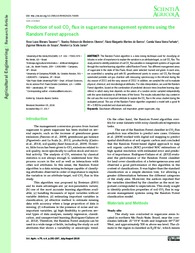Prediction of soil CO2 flux in sugarcane management systems using the Random Forest approach.
Prediction of soil CO2 flux in sugarcane management systems using the Random Forest approach.
Author(s): TAVARES, R. L. M.; OLIVEIRA, S. R. de M.; BARROS, F. M. M. de; FARHATE, C. V. V.; SOUZA, Z. M. de; LA SCALA JUNIOR, N.
Summary: ABSTRACT: The Random Forest algorithm is a data mining technique used for classifying attributes in order of importance to explain the variation in an attribute-target, as soil CO2 flux. This study aimed to identify prediction of soil CO2 flux variables in management systems of sugarcane through the machine-learning algorithm called Random Forest. Two different management areas of sugarcane in the state of São Paulo, Brazil, were selected: burned and green. In each area, we assembled a sampling grid with 81 georeferenced points to assess soil CO2 flux through automated portable soil gas chamber with measuring spectroscopy in the infrared during the dry season of 2011 and the rainy season of 2012. In addition, we sampled the soil to evaluate physical, chemical, and microbiological attributes. For data interpretation, we used the Random Forest algorithm, based on the combination of predicted decision trees (machine learning algorithms) in which every tree depends on the values of a random vector sampled independently with the same distribution to all the trees of the forest. The results indicated that clay content in the soil was the most important attribute to explain the CO2 flux in the areas studied during the evaluated period. The use of the Random Forest algorithm originated a model with a good fit (R2 = 0.80) for predicted and observed values.
Publication year: 2018
Types of publication: Journal article
Observation
Some of Embrapa's publications are published as ePub files. To read them, use or download one of the following free software options to your computer or mobile device. Android: Google Play Books; IOS: iBooks; Windows and Linux: Calibre.
Access other publications
Access the Agricultural Research Database (BDPA) to consult Embrapa's full library collection and records.
Visit Embrapa Bookstore to purchase books and other publications sold by Embrapa.

